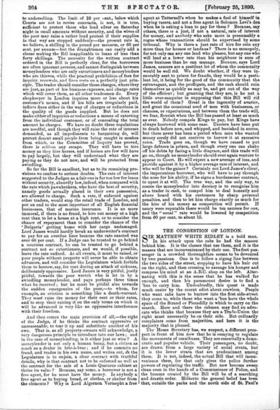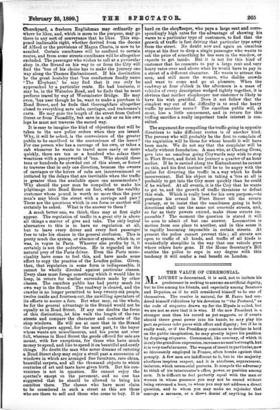THE CONGESTION OF LONDON.
SIR MATTHEW WHITE RIDLEY is a bold man. In his attack upon the cabs he had the masses behind him. It is the classes that use them, and it is the masses that are inconvenienced by their use. The foot pas- senger in a crowded thoroughfare seems to be devoured by two passions. One is to follow a zigzag line between the two sides of the street, stopping to have his hair cut on the right, and then crossing to assuage his hunger and compose his mind at an A.B.C. shop on the left. Alter- nating with this is the sense that he has walked far enough, and then his paramount desire is to find a 'bus to carry him. Undoubtedly, this quest is made much easier by the recent edict about crawlers. People who want cabs have to burrow into the first side-street they come to, while those who want a 'bus have the whole space of the Strand or Piccadilly in which to carry on the search. Here and there the cabmen may find an advo- cate who thinks that because they are a Trade-Union the right must necessarily be on their side. But ordinarily complaints come from majorities, and here it is the majority that is pleased. The Home Secretary has, we suspect, a different pros- pect in front of him now that he is essaying to regulate the movements of omnibuses. They are essentially a demo- cratic and popular vehicle. Their passengers, no doubt, are drawn from a large variety of social strata, but it is the lower strata that are predominant among them. It is not, indeed, the actual Bill that will incon- venience them, for that only gives the police further powers of regulating the traffic. But new brooms sweep clean even in the hands of a Commissioner of Police, and the brooms created by the Bill will be of a searching and drastic order. Hitherto the general belief has been that, outside the parks and the north side of St. Paul's Churchyard, a freeborn Englishman may ordinarily go where he likes, and, which is more to the purpose, may go there in any sort of conveyance that he likes. This sup- posed inalienable right, whether derived from the dooms of Alfred or the provisions of Magna Charta, is now to be assailed. Certain omnibuses will be confined to certain routes, and from some streets omnibuses will be altogether excluded. The passenger who wishes to call at a particular shop in,the Strand on his way to or from the City will find the 'bus of his choice has to make the journey one way along the Thames Embankment. If his destination be the great hostelry that 'bus conductors fondly name ' The Elephant,' he may find that it can only be approached by a particular route. He had business, it may be, in the Waterloo Road, and he finds that he must perforce travel by way of Westminster Bridge. He may even, 'bus user though he be, want to make a purchase in Bond Street, and he finds that thoroughfare altogether closed to everything save cabs, carriages, and tradesmen's carts. He may gaze the length of the street from Oxford Street or from Piccadilly, but save in a cab or on his own legs he must not traverse the sacred way.
It is easy to imagine the kind of objections that will be taken to the new police orders when they are issued. Why, it will be asked, is the convenience of the greater public to be sacrificed to the convenience of the lesser ? For one person who has a carriage of his own, or takes a cab whenever be wants to travel more easily or more quickly, there are ten or a hundred who solace their weariness with a pennyworth of 'bus. Why should these tens or hundreds be crowded out of this street, or forced to traverse that in only one direction, because the owners of carriages or the hirers of cabs are inconvenienced or irritated by the delays that are inevitable when the traffic is greater than the available space can accommodate ? Why should the poor man be compelled to make his pilgrimage into Bond Street on foot, when the wealthy customer whose pound is worth no more than the poor man's may block the street with a carriage and pair ? These are the questions which in one form or another will certainly be asked. What is the answer to them ?
A much better one, we think, than may at first sight appear. The regulation of traffic in a great city is above all things a matter of give and take. The only logical alternative to this is to have no regulation at all, but to leave every driver and every foot passenger free to take his chance in the general confusion. This is pretty much the system, or absence of system, which is, or was, in vogue in Paris. Whoever else profits by it, it certainly is not the pedestrian. He is regarded as the natural prey of the Paris driver. Even the Paris muni- cipality have come to feel this, and have made some effort to copy the practice of the London police. Given, then, that regulation in some form is indispensable, it cannot be wholly directed against particular classes. Every class must forego something which it would like to keep, in return for similar surrenders made by other classes. The omnibus public has had pretty much its own way in the Strand. The roadway is cleared, and the crawler is no longer permitted to keep twenty-six people, twelve inside and fourteen out, the unwilling spectators of its efforts to secure a fare. But what may, on the whole, be for the general advantage in the Strand would not be equally so in Bond Street. If any one doubts the force of this distinction, let him walk the length of the two streets and compare the character and contents of the shop windows. He will see at once that in the Strand the shopkeepers appeal, for the most part, b the buyer whose wants are miscellaneous, and his purse not over full, whereas in Bond Street the goods offered for sale are meant, with few exceptions, for those who have much money to spend, and like to spend it on beautiful and costly things. No doubt the man who never dreams of entering a Bond Street shop may enjoy a stroll past a succession of windows in which are arranged fine furniture, rare china, beautiful carpets, and all the thousand objects to which centuries of art and taste have given birth. But his con- venience is not in question. He cannot enjoy the spectacle except an the pavement, and no one has suggested that he should be allowed to bring his omnibus there. The classes who have most claim to be considered in such a street as this are those who are there to sell and those who come to buy. It is hard on the shopteeper, who pays a large rent and corre- spondingly high rates for the advantage of showing his wares to a particular type of customers, to find that the growth of traffic is fast driving that particular type away from the street. No doubt now and again an omnibus stops at his door to drop a single passenger who wants to ask the price of something he has seen in the window, or expects to get inside. But it is not for this kind of customer that he consents to pay a large rent and very heavy rates over and above what he would have to pay in a street of a different character. He wants to attract the men, and still more the women, who dislike crowds and want to come and go at pleasure. When the roadway at four o'clock in the afternoon is a mass of vehicles of every description wedged tightly together, it is obvious that neither shopkeeper nor customer is likely to have his wish gratified. Does it not follow that the simplest way out of the difficulty is to send the heavy traffic by another route ? The omnibus public will, at most, lose a little amusement, and in return for this trifling sacrifice a really important trade interest is con- sulted.
The argument for compelling the traffic going in opposite directions to take different routes is of another kind. The persons who will probably be the first to complain of the regulation will be those for whose benefit it will have been made. We do not say that the complaint will be wholly without foundation. -A man who, at Charing Cross, gets into an omnibus going Citywards may wish to stop in Fleet Street, and finish his journey a quarter of an hour earlier. If he is carried along the Embankment he cannot do this, and his first instinct will be to be angry with the police for diverting the traffic in a way which he finds inconvenient. But his object in taking a 'bus at all is probably to get into the City more quickly than he could if he walked. At all events, it is the City that he wants to get to, and the growth of traffic threatens to defeat this wish. Which is really best for his own purpose,—to postpone his errand in Fleet Street till the return journey, or to insist that the omnibuses going in both directions shall use the same not overwide streets, and, so far as their powers extend, make those streets im- passable ? The moment the question is stated it will be seen to admit of but one answer. Locomotion is motion from one place to another, and in this sense it is rapidly becoming impossible in certain streets. At present the police cannot prevent this ;. all streets are open to traffic of all kinds, and traffic of all kinds is wonderfully sheeplike in the way that one vehicle goes where others have gone. If the Home Secretary's Bill enables the police to cope in any degree with this tendency it will confer a real benefit on London.







































 Previous page
Previous page